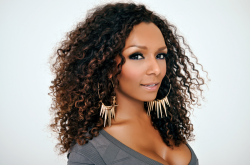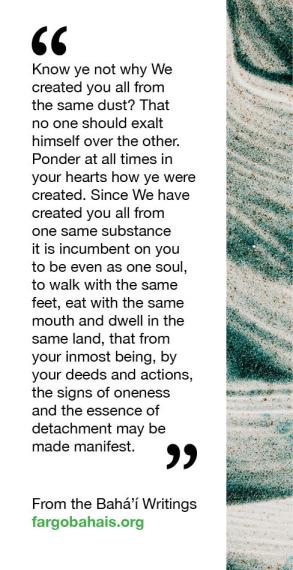Culture | October 11th, 2017

Janet Mock is a legendary figure within the transgender community, especially for transgender people of color. In her career as a writer and journalist, her work has been defined by dignity, fierceness, passion, honesty, and grace.
Recently, I was surprised, honored, and intimidated in equal parts when I was given the opportunity to interview Mock in anticipation of a Q&A event she'll be doing at NDSU. As a trans woman I was excited about this opportunity to engage with Mock and her work, because of the impact her work has had on trans individuals’ lives, as well as my own.
High Plains Reader: What do you hope readers will take away from your new book ‘Surpassing Certainty?’
Janet Mock: My greatest hope is that they would be able to not only learn about a young trans woman's journey, but also have new language to have these conversations within their own intimate circles of friends and family. The hope of any of my writing is to use storytelling to tackle stigma, shame, and misconception, specifically around transgender issues.
HPR: Reading your book ‘Redefining Real,’ I was surprised to learn your husband grew up in North Dakota and I was wondering what your impression of this state is from listening to him?
JM: My husband’s family is from Thompson. Their family has been there for generations on a wheat farm. His mother still lives there, and his aunt is right in neighboring Minnesota. So from my own impressions, he is a mixed black kid who comes from a white family from North Dakota and a black father from Virginia. We have a very blended multicultural family: My family is from Hawaii, his is from North Dakota, so when we all come together it is a beautiful sight. I think it shows the capacity for America to be, right?
It’s blended, that we can have difference, that we can think different politically sometimes, but then also be in a circle together around the kitchen table to have difficult conversations around politics, gender, sexuality and all this stuff.
And I’m sure him bringing back home a black and native Hawaiian trans women to a broadly white family he grew up with in the Midwest, we both learned from each other, and so I often hope that the spaces we can do our greatest activism is the space in which we grew up. I always tell people don’t shy away from that kitchen table conversation with your problematic uncle or that mother-in-law who doesn’t always see things in the same way you see them.
But the things I learned so much about folk in North Dakota, specifically folk who made their living off the land with their hands, is a deep work ethic, respect for land, respect for family, uplifting of family, and the true meaning to be a community.
HPR: You gave an incredibly moving and intersectional speech at the Women’s March. Unfortunately, that fell silent for the Minneapolis Pride Parade a few months ago, where Black Lives Matter had to protest the inclusion of uniformed officers in the wake of Philando Castile shooting. Can you talk a little bit about the importance of combining racial equality with gender and sexual equality?
JM: For a lot of communities there is different struggles for each community, depending on who is in those communities. So, a majority white community grappling with feminism and LGBTQ+ issues is already enough, so a lot of people don’t realize that there are a lot of LGBTQ+ or women who are people of color or undocumented, who have a multitude of layers to their lives.
I think the hardest thing to communicate is the complicated nuances in the lived experience for people who grapple with not only one oppression, but a stack of oppression that they deal with not separately, but similarly, and that compounds and impacts the ways they’re able to navigate this world.
For me, I always try to do it at a base level of my own story and my own life. I’m trying to communicate that complex stuff through storytelling. The way I tell my story, I don’t talk about being trans, I talk about how I learned in the world as a black, poor child. So we’re talking about race and class. In addition to that we’re also talking about gender. I just try to use my own story to communicate that to people.
There are ways in which our communities, of course, have interlocking identities, but at the same time we can look at things like the police force. If you’re an LGBTQ+ person of color, you look at that police force different. They aren’t known to you intimately as someone who will protect or serve you. They are going to interrogate you and look at you suspiciously.
Even having that shared space of the pride parade, we have to be conscious that all people are going to look at the police force differently. Recognizing that is essential to ensuring we’re showing up for everyone. We need to recognize when we say LGBTQ+ community that we’re not only white, only able bodied, or only cisgender. There is so many layers to something as broad as the LGBTQ+ Umbrella.
HPR: Your book “Surpassing Certainty” deals a great deal with building your career as a stealth trans woman of color. Had you been openly trans going into interviews for internships or magazines, do you think you would be where you are now? What about today? What if you were just now going through the process?
JM: I think the reason why I first decided to tell my story in 2011, when I was still an editor at People Magazine, was because I want to show an example of how someone with all my identities could make it through and find some semblance of success and voice. So for me, I hope with every piece of media work I do, I show that it is possible for any of us, for LGBTQ+ people, for folk of color, for women, all of us who are part of all of those things, that you can have a semblance of that.
What has helped out a lot is, number one, the freelance economy, but number two would be the internet. There are more publications and more outlets, there are more opportunities now for trans folk, trans women, and trans folk of color to get their first cracks and then start building and building and building a career from there.
So for me, in my second book, what was so important was to show people how I was able to navigate these systems, where it wasn’t as open, where it wasn’t easy to get your foot in the door. To say, look, you can do it now. There are more opportunities now and more visibility now, which allows people to have more awareness.
Or like your editor said, maybe we should get a trans person to cover a trans person coming to North Dakota who’s talking about trans issue. I’d say five years ago, the gatekeepers would not have been able as to be as conscious about making that sort of decision.
HPR: You’ve become an inspirational figure for many intersections of identity. You’re also only one women whose time is spread thin between career, a family, and friends. What can fans best do to show their appreciation or support, while respecting your time and privacy?
JM: The reason I love social media so much is that it enables me to have a connection, an intimate immediate connection to my followers. For me that is the most immediate, for people who ask if they can send me an email, or letter, that’s a lot of work, it’d be a great deal of labor to respond to even half of them. So, social media is the best place for me to have an ongoing conversation.
“Oh can I have a selfie with you?” Which is fine for a book tour, but you can feel like an object sometimes.
HPR: What advice would you give to other trans people who choose to share their truth on a public platform or who even just come out at work to increase visibility and acceptance?
JM: I think number one would be a support system, you know, it’s important you have spaces where you don’t feel like you have to be open or the educator that tells people your story. Number two, make sure you tell the truth about your experience, without compromise, without apology. Number three, move beyond your own experiences, so if you do develop a platform, inviting other people who may not share the same intersections you have.
Janet Mock will be speaking at NDSU, Thursday, October 19th, at 7pm. Her speaking engagement will be followed by an opportunity for book signings until 10pm. The event is open to the public and is located in the Music Education Building, on 1511 12th Avenue North, Fargo, ND 58102.
[Editor’s note: Faye Seidler is North Dakota Safe Zone Project Spokeswoman]
IF YOU GO:
Janet Mock Q&A
Thursday, October 19, 7pm
NDSU Music Education Building Festival Hall, 1511 12th Avenue North, Fargo
May 12th 2025
May 12th 2025
July 15th 2025
July 3rd 2025
May 19th 2025
__293px-wide.jpg)
__293px-wide.jpg)

_(1)__293px-wide.jpg)

